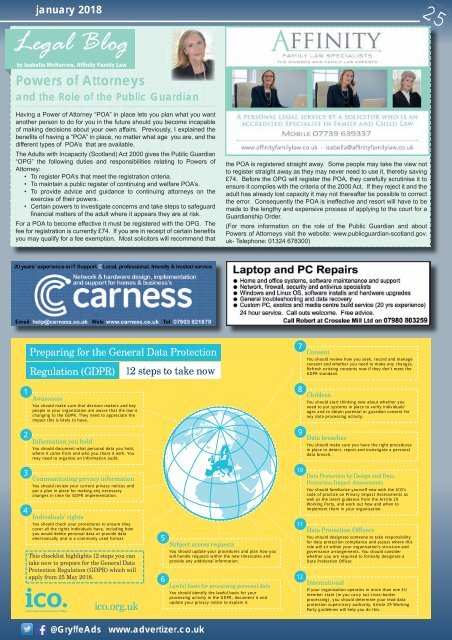280 January 2018 - Gryffe Advertizer
The Advertizer - Your local community magazine to the Gryffe area.
The Advertizer - Your local community magazine to the Gryffe area.
Create successful ePaper yourself
Turn your PDF publications into a flip-book with our unique Google optimized e-Paper software.
january <strong>2018</strong><br />
Legal Blog<br />
by Isabella McKerrow, Affinity Family Law<br />
Powers of Attorneys<br />
and the Role of the Public Guardian<br />
25<br />
Having a Power of Attorney “POA” in place lets you plan what you want<br />
another person to do for you in the future should you become incapable<br />
of making decisions about your own affairs. Previously, I explained the<br />
benefi ts of having a “POA” in place, no matter what age you are, and the<br />
different types of POA’s that are available.<br />
The Adults with Incapacity (Scotland) Act 2000 gives the Public Guardian<br />
“OPG” the following duties and responsibilities relating to Powers of<br />
Attorney:<br />
• To register POA’s that meet the registration criteria.<br />
• To maintain a public register of continuing and welfare POA’s.<br />
• To provide advice and guidance to continuing attorneys on the<br />
exercise of their powers.<br />
• Certain powers to investigate concerns and take steps to safeguard<br />
fi nancial matters of the adult where it appears they are at risk.<br />
For a POA to become effective it must be registered with the OPG. The<br />
fee for registration is currently £74. If you are in receipt of certain benefits<br />
you may qualify for a fee exemption. Most solicitors will recommend that<br />
the POA is registered straight away. Some people may take the view not<br />
to register straight away as they may never need to use it, thereby saving<br />
£74. Before the OPG will register the POA, they carefully scrutinise it to<br />
ensure it complies with the criteria of the 2000 Act. If they reject it and the<br />
adult has already lost capacity it may not thereafter be possible to correct<br />
the error. Consequently the POA is ineffective and resort will have to be<br />
made to the lengthy and expensive process of applying to the court for a<br />
Guardianship Order.<br />
(For more information on the role of the Public Guardian and about<br />
Powers of Attorneys visit the website: www.publicguardian-scotland.gov.<br />
uk- Telephone: 01324 678300)<br />
1<br />
2<br />
Preparing for the General Data Protection<br />
Regulation (GDPR)<br />
Awareness<br />
You should make sure that decision makers and key<br />
people in your organisation are aware that the law is<br />
changing to the GDPR. They need to appreciate the<br />
impact this is likely to have.<br />
Information you hold<br />
You should document what personal data you hold,<br />
where it came from and who you share it with. You<br />
may need to organise an information audit.<br />
12 steps to take now<br />
7<br />
8<br />
9<br />
Consent<br />
You should review how you seek, record and manage<br />
consent and whether you need to make any changes.<br />
Refresh existing consents now if they don’t meet the<br />
GDPR standard.<br />
Children<br />
You should start thinking now about whether you<br />
need to put systems in place to verify individuals’<br />
ages and to obtain parental or guardian consent for<br />
any data processing activity.<br />
Data breaches<br />
You should make sure you have the right procedures<br />
in place to detect, report and investigate a personal<br />
data breach.<br />
3<br />
4<br />
Communicating privacy information<br />
You should review your current privacy notices and<br />
put a plan in place for making any necessary<br />
changes in time for GDPR implementation.<br />
Individuals’ rights<br />
You should check your procedures to ensure they<br />
cover all the rights individuals have, including how<br />
you would delete personal data or provide data<br />
electronically and in a commonly used format.<br />
This checklist highlights 12 steps you can<br />
take now to prepare for the General Data<br />
Protection Regulation (GDPR) which will<br />
apply from 25 May <strong>2018</strong>.<br />
5<br />
6<br />
Subject access requests<br />
You should update your procedures and plan how you<br />
will handle requests within the new timescales and<br />
provide any additional information.<br />
Lawful basis for processing personal data<br />
You should identify the lawful basis for your<br />
processing activity in the GDPR, document it and<br />
update your privacy notice to explain it.<br />
10<br />
Data Protection by Design and Data<br />
Protection Impact Assessments<br />
You should familiarise yourself now with the ICO’s<br />
code of practice on Privacy Impact Assessments as<br />
well as the latest guidance from the Article 29<br />
Working Party, and work out how and when to<br />
implement them in your organisation.<br />
11<br />
Data Protection Officers<br />
You should designate someone to take responsibility<br />
for data protection compliance and assess where this<br />
role will sit within your organisation’s structure and<br />
governance arrangements. You should consider<br />
whether you are required to formally designate a<br />
Data Protection Officer.<br />
12<br />
International<br />
If your organisation operates in more than one EU<br />
member state (ie you carry out cross-border<br />
processing), you should determine your lead data<br />
protection supervisory authority. Article 29 Working<br />
Party guidelines will help you do this.<br />
@<strong>Gryffe</strong>Ads www.advertizer.co.uk


















